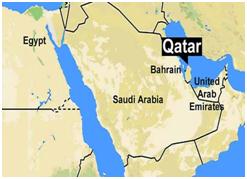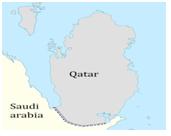‘Gulf states sign ‘solidarity and stability’ deal at GCC summit’
- Posted By
10Pointer
- Categories
World Affairs
- Published
8th Jan, 2021
-
-
Context
In a long-awaited move, Gulf leaders (Bahrain, Egypt, Saudi Arabia and the United Arab Emirates (UAE)) have signed a “solidarity and stability” agreement towards ending the diplomatic rift with Qatar in the 41st Gulf Cooperation Council (GCC) Summit in Saudi Arabia.
-
Background: Regional geopolitics
- In 2017, Qatar was banished from the GCC in a move orchestrated by Riyadh and Abu Dhabi for supporting terror groups, giving home to the Muslim Brotherhood (MB) and generally punching above its weight in the region’s affairs.
- Egypt and the UAE view the support by Qatar and Turkey of Islamist groups like the Muslim Brotherhood as a security threat.
- Saudi Arabia and Bahrain are primarily concerned about Qatar’s ties with Iran.

- Due to these issues, the four countries (Bahrain, Egypt, Saudi Arabia and the United Arab Emirates (UAE)) imposed a partial blockade.
- Qatar, which had angered the other states because of its close ties with Iran had dismissed these allegations.

- Till a certain extent, the move was also a show of dominance by the duo of MbS and UAE’s ruler Prince Mohamed bin Zayed (MbZ), now widely regarded as the most powerful and influential figurein West Asia (Middle East).
- However, the eventual outcomes of the blockade were arguably not what Saudi and UAE expected.
- Conditions: The 4 countries presented Qatar with 13 demands as conditions for ending the embargo.
- They included closing Al Jazeera and other Qatar-funded news outlets, downgrading diplomatic ties with Iran, closing a Turkish military base in Qatar, and ending "interference" in other countries' internal affairs.
- It remains to be seen for now how many of these demands, and till what extend, has Doha agreed to address.
- MbZ: UAE’s ruler Prince Mohammed bin Zayed
- MbS: Crown Prince of Saudi Arabia Mohammed bin Salman
- MB: Muslim Brotherhood, the world’s oldest Islamist movement
|
-
Analysis
The bone of contention
- For Abu Dhabi, the rift with Qatar has been a much deeper, ideological one.
- Doha’s support for the MB has been a singular point of infraction for MbZ, who has taken on MB and political Islamin the region aggressively.
- When MB backed Mohamed Morsi won elections in Egypt in 2012 after the Arab Spring revolution ousted long-time dictator Hosni Mubarak from power, MbZ deported thousands of Egyptian preachers and teachers from the UAE, and later declared MB as a terror group.
- After Morsi was ousted in a coup, and military rule came back to Egypt with Abdel Fattah al-Sisi, Abu Dhabi pushed Cairo to regulate mosques and preachers in a bid to control MB’s influence.
- MbZ’s fraught personal and family historywith MB has made the group a non-negotiable issue with the leader.
|
What is GCC?
- The GCC was set up in 1981 as the political and economic confederation of six states, all headed by monarchies that make up the Arabian Peninsula, minus Iraq and Yemen.
- The US-allied bloc comprises Bahrain, Kuwait, Qatar, Saudi Arabia, Oman and the UAE.
- The GCC countries own about half of the world’s oil and gas reserves, making the alliance a powerful one on the world economic stage.
|
-
Who is in a ‘win-win’ situation?
- Arguably, Qatar has come out victorious in this intra-GCC battle.
|
Qatar, country profiling
- Qatar - the world’s largest exporter of liquefied natural gas - is a small peninsula whose only land border is with Saudi Arabia.
- Doha Capital
- 2.7 million Population
- 11,437 sq km Area
- Arabic Language
- Islam Religion
- Riyal Currency
|
- Even if it has made concessions to achieve normalisation at Al Ula, the small but rich country showcased resilience, and managed the economic blockade without any major domestic crisis.
- During this period, it also invigorated a strong sense of nationalism not only with the local population, but the expats in the country as well, a phenomenon not witnessed often.
- However, to make it so, Doha forged closer ties with Saudi and UAE foes Iran and Turkey.
- In June 2017 itself, Turkish troops arrived in Qatar, with more numbers added in December that year to back Doha’s position and Tehran increased shipments of suppliesto the import dependent country.
- Going forward, it will be interesting to follow how Doha now manages this balance.
- Cutting military ties with Ankara will be an unreasonable expectation, and the ensuing silence by the UAE around this normalisation orchestrated under MbS’s blessings also gives weight to reports of disagreementsbetween MbS and MbZ over regional geopolitics.
|
Did the ‘2017 Boycott’ change Doha?
- The boycott failed to change Doha’s stance, however, instead buoying its young ruler domestically as patriotic fervor swept through Qatar in support of his resolve.
- It also pushed Qatar closer to Turkey and Iran, which rushed to assist the ultra-wealthy Gulf state as it faced medical and food supply shortages in the first days of the embargo.
|
-
What's actually behind the reconciliation?
- To counter Iran:The move is seen by analysts as mainly aiming to create a regional bloc to counter arch-rival Iran.
- Ineffective utilization of financial resources: For MbS (Saudi Arabia), expansive regional conflicts mean more financial resources devoted to defence and foreign affairs, and less availability of funds for the drastic domestic reforms the Crown Prince has planned.
- Changing global perception for economic benefits: For Saudi Arabia, without a drastic shift in global perception, this pivot towards building global financial centers is an extremely difficult dream to achieve.
- Saudi Arabia aims for the transformation of Saudi society not just economically, but politically and culturally as well, is one that is not to be undermined as an easy undertaking.
- MbS wishes to move the kingdom away from being known as a regressive theocratic state is in direct conflict with his aims to build Dubai like centers in Saudi.
- Signalling unity with US: This development, from a Gulf perspective, is also a signal of unity for the incoming administration of president-elect Joe Biden.
- By resolving intra-GCC feuds, Riyadh will be able to put forward a much more united front in Washington DC against Iran, in collaboration with Israel, against the eventual attempts by the Biden administration down the line to bring back the Iran nuclear deal (JCPOA) that Trump, much to Israel and the Gulf’s delight, unceremoniously exited from in 2018.
-
US’s concern
- As Qatar hosts the largest US military base in the Middle East, Trump's administration has been concerned that the rift between Washington’s regional allies has weakened its efforts to create a regional bloc against Iran.
- It is believed that the Trump administration has piled pressure on the Gulf nations to resolve the dispute as it seeks to claim a diplomatic win before President-elect Joe Biden takes office on Jan. 20.
How India responded?
- India welcomed the restoration of diplomatic ties between Qatar and four other Arab countries that had imposed an embargo on it in 2017, saying such a move would give a boost to peace and stability in the region.
- India shares an excellent relationship with all the countries in the GCC.
- The Indian government has worked hard to boost its relations with the Arab states, particularly in defence cooperation and energy security, and it has also welcomed the recent normalisation of ties between Israel and key Arab states such as the UAE.
-
Indian interests in the region
- A peaceful and stable Gulf region is critical to India, and recent diplomatic interventions, which included top level visits to Oman, UAE, Saudi Arabia, Bahrain and Kuwait, were largely designed around one aim, a swift return of the Indian diaspora to the Gulf which was forced to return due to the pandemic in large numbers.
- The GCC states are home to some nine million Indian expatriates, with a majority based in Saudi Arabia and the UAE.
- Beyond these immediate aims, India also aims to create a task force to facilitate Qatari investments in India, with the small nation being one of the richest countries in the world thanks to its vast natural gas reserves.
- It is to note that open talks about investments, a specific task force and so on were far and few while the intra-GCC feud played out, as New Delhi paid more attention to strengthening its relations with UAE and Saudi Arabia while maintaining a traditional diplomatic balance between all sides.
-
Conclusion
Though there is no clarity yet on what kind of concessions were agreed to by Doha in order to make this reconciliation work, and more importantly, how Qatar’s leadership now manages its relations with the Gulf on one side, and Iran and Turkey on the other, with the latter having supported Doha in its time of need. The new developments in the coming days will be a critical test on how the Saudi-Qatar, and perhaps more importantly, UAE-Qatar relationships unfold.

